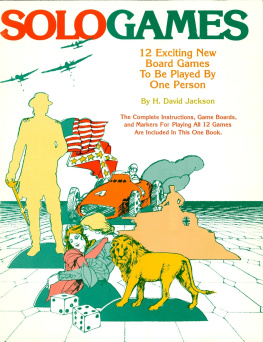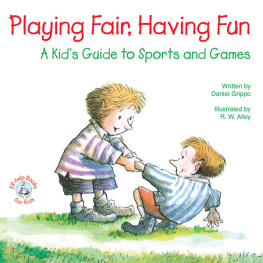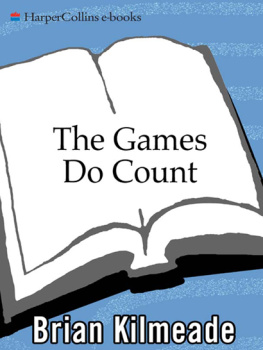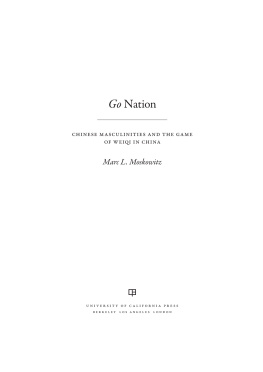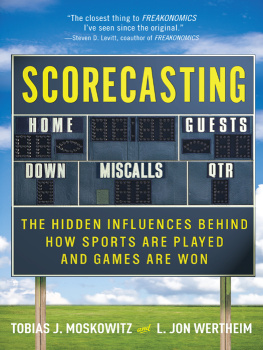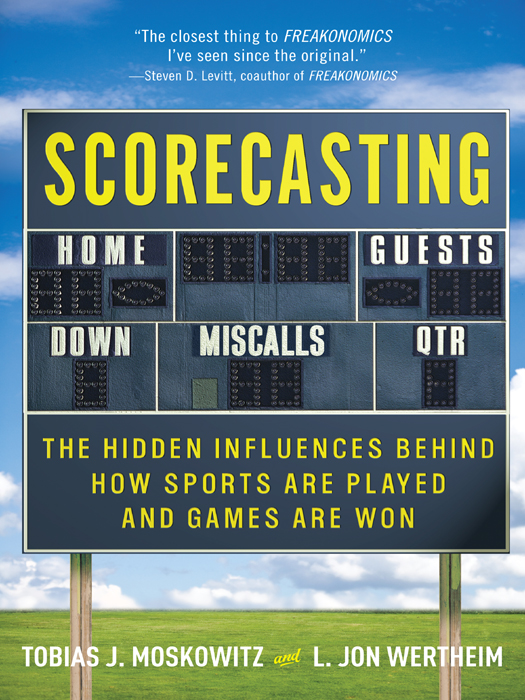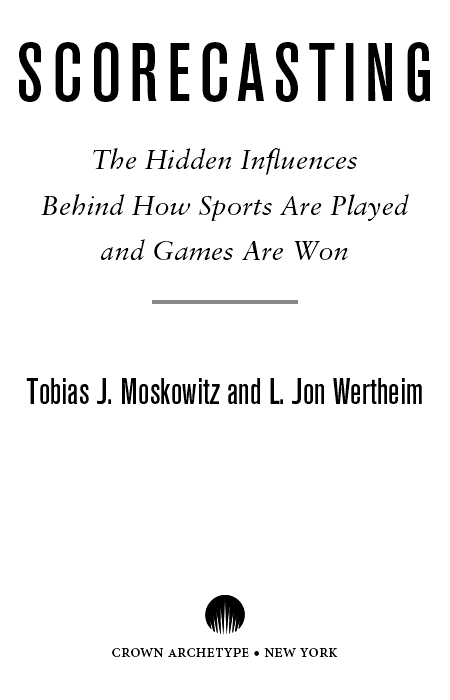Copyright 2011 by Tobias J. Moskowitz and L. Jon Wertheim
All rights reserved.
Published in the United States by Crown Archetype, an imprint of the Crown Publishing Group, a division of Random House, Inc., New York.
www.crownpublishing.com
Crown Archetype with colophon is a trademark of Random House, Inc.
Library of Congress Cataloging-in-Publication Data
Moskowitz, Tobias J. (Tobias Jacob), 1971Scorecasting: The hidden influences behind how sports are played and games are won / Tobias J. Moskowitz and L. Jon Wertheim.
p. cm.
1. SportsMiscellanea. 2. SportsProblems, exercises, etc.
I. Wertheim, L. Jon. II. Title.
GV707.M665 2011
796dc22
2010035463
eISBN: 978-0-307-59181-4
v3.1
To our wives, to our kids and to our parents for driving us between West Lafayette and Bloomington all those years
CONTENTS
Whistle Swallowing
Why fans and leagues want officials to miss calls
Go for It
Why coaches make decisions that reduce their teams chances of winning
How Competitive Are Competitive Sports?
Why are the Pittsburgh Steelers so successful and the Pittsburgh Pirates so unsuccessful?
Tiger Woods Is Human (and Not for the Reason You Think)
How Tiger Woods is just like the rest of us, even when it comes to playing golf
Offense Wins Championships, Too
Is defense really more important than offense?
The Value of a Blocked Shot
Why Dwight Howards 232 blocked shots are worth less than Tim Duncans 149
Rounding First
Why .299 hitters are so much more rare (and maybe more valuable) than .300 hitters
Thanks, Mr. Rooney
Why black NFL coaches are doing worse than everand why this is a good thing
Comforts of Home
How do conventional explanations for the home field advantage stack up?
So, What Is Driving the Home Field Advantage?
Hint: Vocal fans matter, but not in the way you might think
Theres No I in Team
But there is an m and an e
Off the Chart
How Mike McCoy came to dominate the NFL draft
How a Coin Toss Trumps All
Why American Idol is a fairer contest than an NFL overtime
What Isnt in the Mitchell Report?
Why Dominican baseball players are more likely to use steroidsand American players are more likely to smoke weed
Do Athletes Really Melt When Iced?
Does calling a time-out before a play actually work?
The Myth of the Hot Hand
Do players and teams ride the wave of momentum?
Or are we (and they) fooled into thinking they do?
Damned Statistics
Why four out of his last five almost surely means four of six
Are the Chicago Cubs Cursed?
If not, then why are the Cubs so futile?
INTRODUCTION
It was the summer of 1984 in Ortonville, Michigan, a lakeside blip on the map somewhere between Detroit and Flint. The second session of Camp Young Judaeaprovince to a few hundred kids from the American heartlandwas under way, and Bunk Seven fielded a formidable softball team.
There was one problem. In keeping with the camps themes of community and democracy and egalitarianism and the like, the rules dictated that every member of the bunk was required to bat and play the field. Although eight members of Bunk Seven ranged from capable to exceptional softball players, the ninth was, in a word, tragic. One poor kid from Iowa whose gangly body resembled a map of Chilewell call him Ari, thus sparing anyone potential embarrassmentwas a thoroughly pleasant bunkmate, armed with a vast repertoire of dirty jokes and a cache of contraband candy. Unfortunately, Ari was sensationally nonathletic. Forget catching a ball. Asking him to drink his bug juice from a straw would mean confronting the outer limits of his physical coordination. Robert Redford was starring in The Natural that summer, and here, on another baseball diamond, was the Unnatural.
Not surprisingly, when Bunk Seven took the field, Ari was dispatched to the hinterlands of right field, on the fringes of the volleyball court, the position where, the conventional thinking went, he was least likely to interface with a batted ball. The games took on a familiar rhythm. Bunk Seven would seize an early lead. Eventually, Ari would come to the plate. He would stand awkwardly, grip the bat improperly, and hit nothing but air molecules with three swings. Glimpsing Aris ineptitude, the opposing team would quickly deduce that he was the weak link. When it was their turn to bat, they would direct every ball to right field. Without fail, balls hit to that area would land over, under, or next to Arianywhere but in the webbing of his borrowed glove. Eventually hed gather the ball and, with all those ungovernable limbs going in opposite directions, make a directionless toss. The other team would score many runs. Bunk Seven would lose.
A few weeks into the summer, the Bunk Seven brain trust seized on an idea: If Ari played catcher instead of right field, he might be less of a liability. On its face, the plan was counterintuitive. With Ari behind home plate, his clumsiness would be on full display, starting with the first pitch, and hed figure prominently in the game, touching the ball on almost every play.
But there was no base stealing allowed, so Aris woeful throwing wasnt a factor. He might drop the odd pop-up, but at least the ball would be in foul territory and the batter wouldnt advance around the bases the way he did when Ari dropped balls in right field. With the eight capable players in the field, Bunk Seven didnt let too many runners reach base. On the rare occasions when a runner might try to score, there was usually sufficient time for the pitcher or first baseman to cover the plate, gently relieving Ari of his dutiessomething that couldnt be done as easily on a ball batted to right field.
There was a more subtle, unforeseen benefit as well. On pitches that werent hit, it took Ari an unholy amount of time to gather the ball and throw it back to the pitcher. This slowed the games pace considerably. The pre-bar-mitzvah-aged attention span being what it is, the opposing team began swinging at bad pitches, if only to bypass the agony of waiting for Ari to retrieve the ball. And Bunk Sevens pitcher started tossing worse pitches as a result.
Ari never perfected the fine art of hitting, and eventually he ran out of contraband Skittles. But once he was positioned behind home plate, Bunk Seven didnt lose another softball game the rest of the summer.

For two members of Bunk Sevena pair of sports-crazed 12-year-olds from Indiana, one named Moskowitz and the other Wertheimthis was instructive. The textbook strategy was to conceal your least competent player in right field and then hope to hell no balls were hit his way. But says who? By challenging the prevailing wisdom and experimenting with an alternative, we were able to improve the team and win more games.





